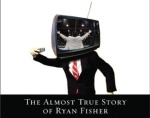If I were a youth pastor—and any teenagers reading this are going to thank heaven I’m not—I’d assign some required reading to my youth group. Namely, I’d assign the comic novels of Rob Stennett, a young writer whose first two books are, in my mind, a kind of reading evangelical Christians need for a time like this.
If you don’t read fiction, bear with me. If the phrase Christian fiction makes you queasy, bear with me—it makes me queasy, too. But Stennett is something altogether new in contemporary Christian writing and altogether necessary for it. His books are published by Zondervan (publisher of The Purpose Driven Life) but would be right at home in your local independent bookstore (if you still have one). The setting for his stories is contemporary evangelical culture, but he addresses themes most Christian fiction doesn’t touch. His writing is funny and generous, page-turning and loose and filled with serious intent.
I hope people will read Stennett because he is writing about issues on which we very much need to reflect and doing so in a way that invites a lot of people to the conversation. His books are readable and perfectly pitched for reaction. He’s joking with us, but he’s not kidding.
A Mega-pastor and the Apocalypse Stennett’s debut book, The Almost True Story of Ryan Fisher, is about a real estate salesman who decides evangelical Christians are the perfect market for his business. As an exercise in market research, he darkens a church door for the first time; and he’s so impressed by the charisma and successful glow of the senior pastor that he decides real estate is for turkeys—he’ll become a pastor instead! Fisher plants a church featuring worship services that take people through the full gamut of spiritual emotions—from happiness to glee. (Ever been to one of those?) Before he knows it—before, in fact, he has time to decide whether or not he’s even a believer in the first place—he’s leading the fastest-growing body of self-helped Christians in America.
Stennett’s debut book, The Almost True Story of Ryan Fisher, is about a real estate salesman who decides evangelical Christians are the perfect market for his business. As an exercise in market research, he darkens a church door for the first time; and he’s so impressed by the charisma and successful glow of the senior pastor that he decides real estate is for turkeys—he’ll become a pastor instead! Fisher plants a church featuring worship services that take people through the full gamut of spiritual emotions—from happiness to glee. (Ever been to one of those?) Before he knows it—before, in fact, he has time to decide whether or not he’s even a believer in the first place—he’s leading the fastest-growing body of self-helped Christians in America.
 Last year, Stennett published The End Is Now, a sincere satire about the rapture coming to one town and one town only: Goodland, Kan.; or so one local boy prophesies and gets enough people to agree with him that chaos ensues. (In fiction, the rapture is rarely good news even to people who believe it is good news.) Of course, The End Is Now is barely about the rapture; it’s about what belief in the rapture does to some individuals, families and entire communities.
Last year, Stennett published The End Is Now, a sincere satire about the rapture coming to one town and one town only: Goodland, Kan.; or so one local boy prophesies and gets enough people to agree with him that chaos ensues. (In fiction, the rapture is rarely good news even to people who believe it is good news.) Of course, The End Is Now is barely about the rapture; it’s about what belief in the rapture does to some individuals, families and entire communities.
Admittedly, these conceits have the whiff of cynicism: a realtor who stumbles into megachurch pastoring and a small town so consumed with the end that it can’t deal with the present. However, part of Stennett’s gift (and the reason I’m dedicating an entire column to his work) is his ability to take these comical setups and treat them with a sort of humorous sobriety. His novels aren’t mean-spirited; they’re provocative explorations of real currents within American spirituality. The Almost True Story of Ryan Fisher and The End Is Now take on pressing themes within the state of evangelicalism as we know it—the hypocrisy of celebrity pulpits, the Oprah-izing of the gospel, the difficulty of coherent belief—without trying to deliver the last word on these issues.
Stennett’s breezy style raises serious questions about Christianity as we know it. I hope he’ll keep asking them, and I hope we’ll have the conversations he means to inspire.
(For more info visit Rob Stennett at his blog: robstennett.blogspot.com)




